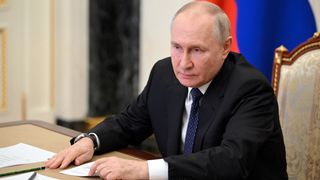The war in Ukraine has undergone a strategic shift.
While the mutiny by Yevgeny Prigozhin and his infamous Wagner mercenaries degenerated into farce and exile, there is no question that the consequences of the fracturing of the Russian military elite have severe consequences well beyond Moscow.
Consider for a moment the failure of the Russian military to respond effectively to Prigozhin’s treason.
This is illustrated in three episodes which are entirely based on reported facts.
First, the Wagner mercenaries occupied the military headquarters at Rostov-on-Don without any opposition.
So far as can be determined, many among the local populace supported the Wagner revolt.
The second point to bear in mind is the very easy journey up the M4 highway to Moscow by the Wagner motorised column.
It is not difficult to stop an advance on a highway with a sustained military presence.
True, there were aircraft attacks, but all of these appear to have ended in failure.
What this demonstrates, from Rostov-on-Don to Voronezh, is that the Russian army lacks defence in depth.
This was graphically on display with the Russian collapse after the Ukrainian army counterattacked around Kharkiv some months ago.
Before they knew it, the Ukrainians were on the Russian border, with Australian-gifted Bushmasters prominent.
President Volodymyr Zelensky is absolutely right when he underlines the self-evident fact that the combat strength of the Russian army is entirely in Ukraine.
There appear to be no ready reserves to be deployed in an emergency.
When the Ukrainian counter-offensive crystallises in final form, the Russian defences may prove more brittle than Western intelligence has assumed.
When the Ukrainian counter-offensive crystallises in final form, the Russian defences may prove more brittle than Western intelligence has assumed.
Finally, by way of illustrating the above, it was reported that in response to the threat posed by Wagner, Putin had to resort to ordering his Chechen mercenaries to respond.
The mobilisation of the Chechens demonstrates anew just how dependent Moscow is on mercenary forces.
This is not true only of Ukraine but of Russian deployments as far afield as Syria and Africa.
Prigozhin’s exile somewhere in Russia or in places unknown has unforeseen consequences for the deployment of Wagner forces abroad.
Will they be absorbed successfully into the Russian army?
If Prigozhin’s claims about Russian military incompetence and the failure of its logistics chain are even halfway true, then the mercenaries will find no home under the official Russian colours.
By the way, everyone should note the Kremlin's recurring statements to the effect that Wagner never had any link to the Russian state were exploded by the fact that Moscow now openly talks in terms of being the paymaster for its forces.
The impact of this in terms of international law is that Wagner is now recognised as having been under Moscow’s command and control for years.
The Geneva Convention applies.
Wagner war crimes can therefore be conclusively attributed to the Kremlin and ultimately to the weakened Vladimir Putin.
Two weeks in America have convinced me that the US consensus in supporting Ukraine remains fundamentally intact.
The Biden Administration and the Congress, still supported by broad public opinion, continues to offer leadership to NATO and other democratic supporters, such as Australia, in providing the necessary capability for Ukraine to repel the Russian invasion.
The upcoming NATO summit in Lithuania will likely reinforce this conclusion.
Moreover, the Americans have made it utterly clear to Moscow that the Wagner debacle was entirely of their own making and had nothing to do with either the US or NATO.
Moreover, the Americans have made it utterly clear to Moscow that the Wagner debacle was entirely of their own making and had nothing to do with either the US or NATO.
US Secretary of State Antony J. Blinken observed that these events were “a direct challenge to Putin’s authority” and highlighted the “real cracks” in his leadership.
A Russian victory on the battlefield in Ukraine now seems remote.
A Ukrainian victory, by which they reclaim most of their territory, now seems possible but remains difficult.
Winston Churchill made the observation at a turning point in the war against the Axis that the Allies had not reached the end or even the beginning of the end of the war.
But Churchill maintained they had achieved the end of the beginning.
This is the point that Ukraine has now reached.






